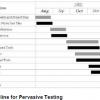The Latest
|
A Look at a Test Data Generator[magazine] When Pat McGee couldn't find the right tool for the job, he and his team wrote one in Visual Basic for Applications for Microsoft Excel. They used Excel for all the data entry and calculations. Several groups in the project ended up using the tool–including testers, developers, and database administrators. Read how they did it. |
Pat McGee
July 30, 2002 |
|
 |
Hidden Risks in Web Code[magazine] A look at the HTML source code behind Web sites can often reveal security issues that would never be uncovered by those blissfully ignorant of the code. This bug report will examine two common methods of maintaining state and passing data in Web-based systems–hidden form fields and the HTTP GET method–and demonstrate some of the associated security risks through an examination of HTML code. |
Rich Brauchle
July 30, 2002 |
|
Ken Schwaber on Agile Processes[magazine] Agile processes are founded on an empirical model of process control theory, and they deliver value iteratively and incrementally. Customers and development teams collaborate to wrest the greatest value from advanced technologies and emerging requirements, which practitioners call "value-driven" software development. Here, the developer of the agile process Scrum gives his recommendations for sources on agile processes. |
Ken Schwaber
July 30, 2002 |
|
|
Tinkerable Software[magazine] In what ways should software be like a house? In a recent issue of STQE magazine, Technical Editor Brian Marick’s musings about the concept of “tinkerable software” generated some interesting discussion about the very nature of software design. This week’s column runs a portion of that piece so that our Sticky-minded readers can sink their thoughts into the concept. |
Brian Marick
July 30, 2002 |
|
|
|
Telling It Like It Is: Test Status Reports as Tools for Change[magazine] Producing regular test status reports makes your progress—and problems—visible to those outside your group. Here's how spending a couple of hours a week on gathering and reporting results can be crucial to your software development team's success. |
Pete TerMaat
July 30, 2002 |
|
Use Cases, Ten Years Later[magazine] Use cases have experienced a long and sometimes rocky history. Look back on the evolution of use cases to better understand how to use them today. |
||
|
Release Criteria: Is This Software Done?[magazine] For any project, the big question is: "Is this software ready to release yet?" Explore how to answer that question with confidence, by learning how to define success and how to gain consensus on release criteria. |
||
 |
Karl Wiegers on Humanizing Peer Reviews[magazine] How serious are you about the quality of your work? Learn how to set aside egos and start benefiting from the experience and perspective of your colleagues. |
Karl E. Wiegers
July 30, 2002 |
|
A Lesson in Scripting: Improve Your Testing with Programming Skills[magazine] You can write simple programs to help with your daily testing tasks using Perl or other scripting languages. Here's a primer on scripting languages and programming skills for testers. |
||
|
Becoming Indispensable[magazine] How can you achieve the lofty status of being an "indispensable" employee? Elisabeth Hendrickson shares some valuable tips, including how to adjust your attitude, where to invest your time, and how to communicate better. |
||
|
A Look at the Ruby Scripting Language[magazine] The Ruby language has gained many followers recently. Ruby offers many of the same features that made Perl a popular scripting language, but also has the advantage of being a fully object-oriented language. While developing an object-oriented application in Perl might be a bit clumsy, Ruby supports object-oriented programming quite naturally. This can offer many advantages when developing a large testing application. |
Phil Tomson
July 29, 2002 |
|
|
Small Change, Big Trouble[magazine] Ross Collard researches the cause of coding errors, and recommends some process improvements companies should implement, including establishing the minimum amount of regression testing required for new releases. |
||
|
But I Don't Have Time![article] Overworked software professionals sometimes skip things they know they should do, because they "don't have time." In this week's column, Karl Wiegers asks you to think about what you really mean when you say you don't have time, and he cautions you to take time to make time. |
Karl E. Wiegers
July 25, 2002 |
|
|
Don't Use Bug Counts to Measure Testers[magazine] Cem Kaner tells us why we should not use bug counts to measure testers. Using examples, he illustrates two problems: 1) bug counts are poor measures of individual performance; and 2) the side effects of using bug counts as a measure are serious. |
Cem Kaner
July 25, 2002 |
|
 |
Maximum ROI through Pervasive Testing[article] Pervasive testing means getting the right people working together through the right processes at the right time for high-ROI testing. Through pervasive testing, all the ideas we've explored so far come together.Web site (as of late-July 2002).
|






